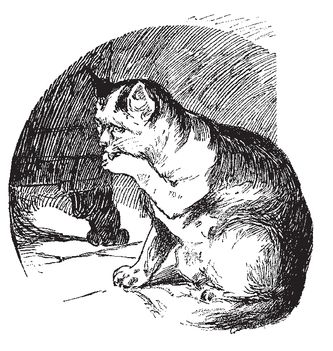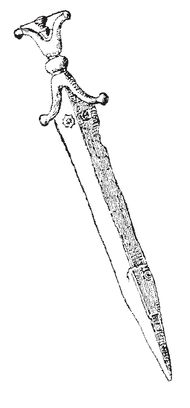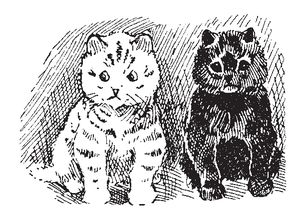Three Wise Cats (17 page)
Authors: Harold Konstantelos

“They are wiser than we are,” Kaspar told the servants. “We, too, need rest. And we shall do so today.”

Late that afternoon, Balthazar suddenly stood and shouted, “A camel! One lone camelâand one rider. It is the slave boy Herod gave us!”
The camel came slowly into the camp, grumbling a greeting to the other camels as it recognized them. Thomas was exhausted, slumped over the beast's neck, and Kaspar felt heartsick as he gently lifted the boy from his saddle. Black circles were under his eyes, and he begged for food and water.
Melchior had a servant tend to the weary young camel and dipped a large bowl of good hearty soup from the kettle over the fire.
Thomas gulped at the soup and then closed his eyes, only to sit up suddenly. “You must know! King Herod wanted me to go back with soldiers to Bethlehem and show them where the babe was. But I slipped out of Jerusalem after my camel rested a few hours. How I found you, I do not know. But I dare not return to Herod now.”
“Indeed you shall not,” Kaspar told him. “And I owe you an apology, for it was I who insisted you must return to the king, and on camelback. You have done well. Will you come with me to Athens? I wish to grant you your freedom, and to offer you a home as well.”
Thomas had tears in his eyes, and he sniffled. “I will come with you willingly. For I wish to learn more of this Messiah. It was He I asked, as we ran through the days and nights, to guide me to you, for I had no idea where to find you in this vast desert.”
Dawn came, and a cold wind whistled from the north as they broke camp and rode out upon the desert once more. Suddenly the air was filled with shouts and curses, and the small caravan looked back to see bandits riding fast horses across the desert. Wicked sword blades glittered in the early sunlight, and Kaspar shouted to his servants, “Stay together; do not fall behind! If one camel slows, we all slow. We ride together or we ride separately to a sure death!”

Then began a desperate dash across the sandy soil. Their hired guards were too few to defend against such numbers of brigands. The camels at first seemed to have the advantage, for their feet were adapted to the sand far better than the hooves of the horses, but they were still tired from their forced journey of the previous days. Ira looked out from his basket and gritted his teeth, watching the horses gaining on them.
They must be a gang of desert marauders
.
They may have followed us for days, waiting for us to tire, or perhaps they merely lie in wait for unlucky travelers. Only Roman soldiers could save us now, and how are they to find us in time?
He thought of the Messiah and silently sent a prayer to Him, asking for rescue to come, somehow.
They must be a gang of desert marauders
.
They may have followed us for days, waiting for us to tire, or perhaps they merely lie in wait for unlucky travelers. Only Roman soldiers could save us now, and how are they to find us in time?
He thought of the Messiah and silently sent a prayer to Him, asking for rescue to come, somehow.
And come it did, for from behind a series of low hills came legionnaires marching, banners and plumes waving in the bitterly cold air. The bandits, seeing the soldiers, began yanking on their horses' reins, trying to turn the galloping beasts before they could bring their riders within range of the Romans' weapons. Ira yowled an exuberant greeting to the soldiers, even knowing full well they couldn't hear him.
The caravan raced down a small hill and finally got the camels calmed to a walk. “We shall make camp here tonight!” Kaspar called, his chest heaving from the mad ride across the desert.
“Thank the Messiah for sending us succor!” Melchior called to his companions and slid from his saddle before his camel had fully knelt. “How glad my heart will be to see my home in Alexandria once more!”
The members of the caravan turned in time to watch as a volley of Roman arrows found their marks, and seventeen of the band of cutthroats died in their saddles. The other thieves screamed horribly and beat their tired horses with whips, riding back over the far crest of the small hills and disappearing from view. Ira leaped from his basket and danced in the sand. “Well done, men! Well done!”
He raced over to the packs as soon as they were stacked and clambered upon them, the better to watch the soldiers as they regrouped and marched toward the camp. A chariot and driver joined them, the driver's plumed helmet nodding as the commander congratulated his young men on their successful rout of the bandits.
And then, as the centurion began driving closer to the camp, something about the man seemed familiar to Ira. He stretched his neck to its limit, trying to see yet farther. Quickly he licked a paw and rubbed it across his face and tried to calm his pounding heart.
It can't be! But it is! Thank You, Messiah! Thank You!
It can't be! But it is! Thank You, Messiah! Thank You!

As the gleaming silver chariot entered the camp, Ira leaped from the packs and dashed toward the vehicle. The centurion handed his reins to another soldier and turned to speak to the man he assumed was the caravan leader.
Gracus stared and removed his helmet, to run his hand through his thick hair in his usual gesture. “Can it indeed be Alexos's kinsman, Kaspar of Athens?”
Then the centurion's face turned white, for Ira ran straight up to him, stopped, and held up his left leg, turning his paw in a salute.
“My little soldier!” he gasped. “I feared you dead!” And he stooped and gathered Ira into his arms, not caring whether that was dignified behavior for a Roman centurion. Ira purred as loudly as he could and licked Gracus's face with his rough tongue.

A short distance away, Kezia and Abishag watched, lumps in their throats as they saw Ira greet the man who was his true friend and comrade.
“So Ira will be a soldier once more,” Kezia said softly. “I certainly hope Gracus has another harness made for him; that one is too shabby for words, even if Kaspar did have it cleaned and repaired.” And she sniffed, but whether from disdain or a full heart, Abishag couldn't tell.
That night around the campfire, the ordinary stars saw the members of the caravan and the soldiers trading tales, enjoying each other's company.
Finally, Gracus lowered his goblet and demanded, “But how does my small soldier once again have a straight leg? For I know he limped from it being broken; it was my horse that stepped upon him and I myself set the leg!”
“Now you must indeed believe in miracles,” Kaspar told him, and he related the story of the star, the angels, and the wondrous occurrences while He was yet a newborn babe.
“So there is but One God, and not the multitudes I have tried to placate all my life?” Gracus said, wonderingly. “And what is the Messiah's given name? Has He one?”
“His parents call Him Jesus of Nazareth,” Melchior told Gracus. “You shall hear more of Him in future years.”
Before they slept that night, Gracus agreed to escort the three wise men, Thomas, and the caravan back to Tyre.
“My assignment in Zeugma was foreshortened by the emperor,” Gracus told them. “He issued orders for many of his soldiers to return to Rome. I go to Tyre myself now to meet the rest of my household.” He glanced at Ira, who lay, utterly contented, upon the centurion's bare knees. “I may be involved in some bloody campaigns, once I command the emperor's own troops. This little soldier may have to stay at home to look after Polla and my baby daughter.” Ira opened one eye and looked at Gracus, as the other men about the campfire laughed.
Kaspar transferred Ira's basket to Gracus's chariot the next morning, and his foster sisters watched as their brother raised a pawâbut with no saluteâas he departed, to ride that day in Gracus's chariot once again.
“I hope he doesn't really imagine himself leading the soldiers at the head of the caravan.” Kezia giggled.
“Oh, you know Ira,” Abishag said. “By now, in his imagination, he's at least a general.” Then they leaped into their camels' baskets, setting off on their journey once more, content to know Tyre was the next destination.
Now it was Kezia's turn to peer from her basket, trying to smell the salt air or see the glint of sunshine upon the sea as they traveled closer to Tyre and its enormous harbor.
They entered the city very late at night, and Gracus bid them stay at his temporary home until they could find ships and to see Polla and his baby daughter, Livinia. “She should have been a son,” he said, smiling. “But Polla assures me the next will be a son for Caesar.”

Two mornings later, the three men and Gracus were on their way to the harbor to secure passage for Balthazar to Antioch, Melchior to Alexandria, and Kaspar to his home in Athens. Melchior had been the object of much teasing, for Kezia set up such a terrible fuss when the men started to leave, he had been compelled to bring her in her basket.
“I do not think it is I from whom she wishes not to part,” he grumbled, “for Kaspar has told us often of the snake she killed aboard Alexos's ship, thus saving him from a terrible death. She never killed a snake for me, and yet did I not carry her upon my camel everywhere I went?” And then Melchior laughed.
To Kezia's joy, Alexos's graceful ship
was
in the harbor, and soon a runner was dispatched with a message for him.
was
in the harbor, and soon a runner was dispatched with a message for him.
Other books
First Kill All the Lawyers by Sarah Shankman
Appointment with Death by Agatha Christie
The Hawk and the Jewel (Kensington Chronicles 1) by Lori Wick
Club Agony & Ecstasy Box Set by Lexi Cross
The Orange Grove by Larry Tremblay
Con la Hierba de Almohada by Lian Hearn
Worth Any Price by Lisa Kleypas
The Marked Girl by Lindsey Klingele
The Sea and Civilization: A Maritime History of the World by Lincoln Paine
